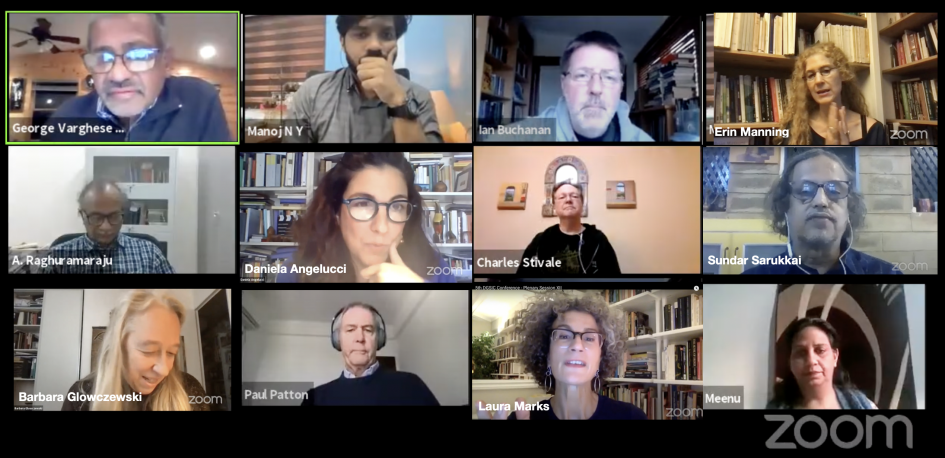Fifth Deleuze and Guattari Studies in India Conference 2021 (Online)
November 11-14, 2021
Life Infinite: Immanence, Inflection, Indeterminacy
Organised by
Deleuze and Guattari Studies in India Collective
Conference Convener
Dr Manoj NY
Rationale
Contemporary research both in humanities and social sciences seems to be converging on a common point, which is life, or more precisely, the “distinction between the living and the non-living”. As part of it , new analytic strategies are mooted that involve a wide spectrum of disciplines and perspectives. Affective turn, ontological turn, new materialism, speculative realism, postcolonial studies, feminism, queer and transgender studies, critical race studies, technoscience studies, and Anthropocene are a few of them that have chosen life as their major theoretical object. This contemporary development is complemented by the return of some old philosophies as well like animism and vitalism so as to begin their own new experiments with life. We also see that the obsession with life straying into strange territories that proliferate new versions like “beta life”, “hypothetical life”, “nonstandard life”, “nonterran life”, “unfamiliar life”, “life as we do not know”, “alternative biology”, “Life 2.0.” , and so on.
Truly life has spread out in a limitless cosmic canvas. The spatial range is astounding. From the ocean’s depth to astral bodies life is being searched for avidly. On the other side, new loci and versions of life are emerging in astounding speed. We need not travel to the far end of the universe to see the complexities of life. New life forms are floating on our own computer screens today; a computer program run by the principle of cellular automata is deemed to be alive; a computer virus is as deadly as a biological virus. There exists a fundamental equivalence between the genetic and the computer codes.
The spatial complexity is complemented by the temporal infinity. True, the larger organisms may get destroyed in the face of environmental hazards like nuclear explosion or a pandemic. But the same rule does not apply in the case of microorganisms, especially those called “extremophiles”. They are microorganisms that can tolerate and survive in extreme geochemical and geophysical conditions. From the perspective of extremophiles, which can survive in waste or nuclear radiation, there can be no end to life on earth. Humans may end, but life will continue; no doubt, the grimmest axiom to be derived in the milieu of a world-destroying pandemic now.
Deleuze and Guattari push the perimeter of life further with their concept of nonorganic life. Deleuze claims that everything he has written is vitalistic. For him, the power of a nonorganic of life can be found in a line that is drawn, a line of writing, or in a musical line. From the perspective of his concept of A Life and immanence, it is only the organisms that die and not life (Negotiations). Deleuze and Guattari’s philosophy, therefore, offers a resourceful theoretical toolkit to analyze all life forms and the subtleties they raise, be they organic, nonorganic, musical, cinematic, architectural, astrobiological, digital, or even cultural and social.
As explained, the theme of the conference encompasses both the organic and the nonorganic life forms as they unfold in nature, society, culture, and history. There will be specific sessions and panels on themes pertaining to the Indian context. The themes of the conference include but not limited to those listed below:
Conference and Panel Themes
- Biophilosophy and Bionics
- Memory and Desire
- Artificial Life and Gender
- Social Life of Things
- Biomedia , postmedia and the Digital Assemblages
- Philosophy of Objects
- Posthuman Hybridities
- Trans and Antihumanism
- Bio-Capitalism and Colonization of Life
- From the perspective of Pandemic…
- Climate Change and Anthropocene
- Minor Cinema/Literature/Arts
- Diagrams of Caste and Indian Society
Plenary Speakers
Daniela Angelucci, University Roma Tre, Italy
Eva D Bahovec, University of Ljubljana, Slovenia
Jeffrey A Bell, Southeastern Louisiana University, USA
Joff PN Bradley, Teikyo University, Japan
Ian Buchanan, University of Wollongong, Australia
Soumyabrata Choudhury, Jawaharlal Nehru University, India
David R Cole, Western Sydney University, Australia
Claire Colebrook, Pennsylvania State University, USA
Andrew Culp, CalArts, USA
Rick Dolphijn, Utrecht University, Netherlands
Gary Genosko, Ontario Tech University, Canada
Barbara Glowczewski, College de France, France
Emine Gorgul, Istanbul Technical University, Turkey
Leonard Lawlor, Pennsylvania State University, USA
Alex Taek-Gwang Lee, Kyung Hee University, South Korea
Hsien-Hao Sebastian Liao, National Taiwan University, Taiwan
Erin Manning, Sense Lab, Concordia University, Canada
Paul Patton, Wuhan University, China
Ronki Ram, Panjab University, India
Sundar Sarukkai, Indian Institute of Science, Bangalore
Janae Scholtz, Avernia University, USA
Tony See, University of London – SIM Global Education, Singapore
Daniel W Smith, Purdue University, USA
Henry Somers-Hall, Royal Holloway, UK
Charles J Stivale, Wayne State University, USA
Kenneth Surin, Duke University, USA
Janell Watson, Virginia Tech, USA
Nathan Widder, Royal Holloway, UK
